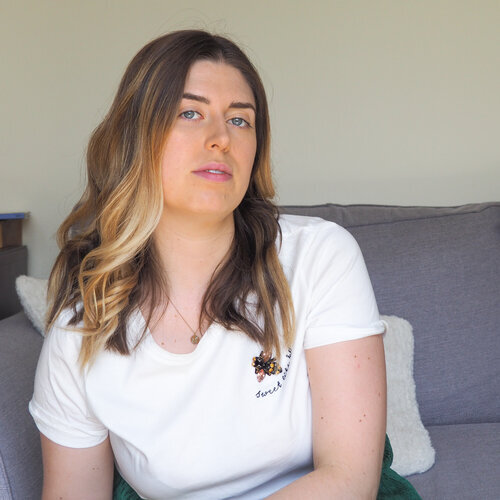We’ve all heard that the fashion industry is one of the most polluting industries, but there are so many elements within the fashion industry that make it unsustainable; it can be difficult to comprehend all the ways that fashion damages the environment. If we can understand how the fashion industry pollutes the planet, we can start to make more informed decisions when we shop to avoid causing more harm. Fast fashion is particularly damaging to the environment, often being produced very rapidly and in vast quantities.
Fast fashion produces high volumes of low-quality clothes, with garments losing their shape or fading in color after a few washes. This has resulted in the average time a piece of clothing is worn drastically reduced over the last 15 years. For example, in the United States, clothes are only worn for around a quarter of the global average, as reported by the Ellen MacArthur Foundation based on the data of Euromonitor International.
Trends also play a huge role in the destructive cycle of fast fashion. As brands need to quickly turn out thousands of new items every month, they look to celebrities, social media and pop culture for inspiration, creating new ‘trends’ that they push to their consumers. Shoppers, especially younger women, feel they have to keep up with the trends and continually buy new clothes to achieve their desired aesthetic, often mainly for social media.
The rate at which clothes are being produced today has resulted in many types of pollution, causing damage to the land, water, air and the people and animals that share this planet. We’ll break down some of the worst ways that fashion contributes to pollution, and its effect on the environment.
Greenhouse Gas Emissions
The apparel industry accounts for 10% of global carbon emissions, and most of the world’s clothes are produced in China, Bangladesh, or India, countries largely powered by coal. This is the most polluting type of energy in terms of carbon emissions. Greenhouse gas emissions occur during the production, manufacturing and transportation stages of the fashion supply chain, but one could argue they are produced elsewhere too. The fashion brand headquarters produce gas emissions, as do the retail stores and even during the product use, e.g., washing your clothes. In the US, doing the laundry in each household in the country is estimated to release an average of 240kg of greenhouse gas emissions a year.
Greenhouse gases have a variety of environmental and health effects. They’re causing climate change by trapping heat in the Earth’s atmosphere, leading to more extreme weather around the world, disruptions to our food supply chain, and increased wildfires. Greenhouse gases also contribute to respiratory disease from smog and air pollution.
Water
Creating clothing is an incredibly water-intensive process, and the fashion industry is the second biggest polluter of freshwater resources on the planet. Large volumes of water are needed at nearly every stage of the process, from textile production to dyeing fabrics. To produce one pair of jeans requires around 10,000 liters of water, according to the United Nations. Leather production is one of the biggest contributors to water pollution in the fashion industry, with 22,000 liters of untreated liquid toxic waste being dumped daily into waterways by tanneries in Dhaka, Bangladesh.
Water contamination can happen at various stages, too, from the use of fertilizers in cotton production, which heavily pollutes runoff waters and evaporation waters, to the chemicals used in textiles factories, including lead, mercury, and arsenic. When this wastewater enters the local waterways surrounding the factories, it is extremely harmful to the aquatic life and the health of the people living in close proximity to the water.
Chemicals
Sadly, chemicals play a big role in the fashion industry. To produce clothing, chemicals are used during fiber production, dyeing, bleaching, and wet processing. Material production, in particular, causes a large percentage of the chemicals used in fashion; for example, non-organic cotton production uses 11% of the world’s pesticides and 24% of all insecticides. Animal leather is another material that heavily relies on chemicals, with 80% of the world’s leather production using chromium. This toxic chemical compound can cause a range of effects on the humans who come in contact with it, including kidney or liver damage, long-term cancer and reproductive problems.
The chemicals used throughout the garment-making process are polluting our waterways, causing soil degradation, and poisoning animals on land and sea. Humans are also affected by the chemicals from the fashion industry, from the workers who handle the raw materials to the consumers themselves. Research has shown that our body’s largest organ, our skin, can absorb chemicals from the clothes we wear, leading to effects such as skin irritation, developmental issues, and even cancer.
Plastic
While many of us are trying to cut down on the amount of plastics we buy when we’re shopping for groceries, it’s harder to detect the plastics that are in our clothes. Many of the fabrics used to produce clothing contain plastics like polyester, nylon, acrylic and polyamide, made using a process called polymerisation. Melted down, plastic chips are spun into a strong, light, fast-drying plastic yarn and then turned into fabric. Up to 64% of new fabrics made are currently made from plastic. As plastics are derived from crude oil, coal and gas, buying clothes with plastics continues the demand for fossil fuels.
Plastic clothing also causes microfibres (tiny plastic particles) to release during washing, with studies claiming as many as 700,000 microplastic fibres can be released in a single clothes wash. Microplastics then enter rivers and oceans, causing harm to marine life and can even be transferred to humans, with researchers finding microplastics in human organs.
Waste
With fast fashion causing clothing to be seen more as consumable goods rather than an investment, we’ve seen clothing become increasingly disposable, leading to vast amounts of textile waste. On average, each American now generates 82 pounds of textile waste each year, which adds up to more than 11 million tons of textile waste from the U.S. alone.
Of the discarded clothes, only 15% is recycled or donated; the rest goes to landfill or is incinerated. Clothes with synthetic fibers can take hundreds of years to decompose, and during the decomposition process, textiles release methane gas and leak toxic chemicals and dyes into the groundwater and our soil.
Knowing the different types of pollution is an important step to understanding what true sustainability means within the fashion industry, but what can we do to reduce the impact our clothes have on the environment?
Here are a few tips to avoid the most polluting materials and reduce your wardrobe’s environmental footprint:
Check labels before you buy – what is the item made of?
Avoid fabrics like non-organic cotton, conventional leather and synthetics like polyester and nylon
Opt for organic and natural fibers that do not require toxic chemicals to be produced
Look out for third-party Certification Labels or other indications that a brand has taken steps to reduce their environmental impact
Wash your clothes less often and only at 30 degrees
Use a Guppyfriend bag to catch microfibres from your synthetic clothes
And, as always, buy less, choose well and make it last
About the Author
Sarah is a freelance writer with a focus on vegan fashion, sustainability and ethically made clothes. She campaigns for change in the fashion industry through her blog and on her Instagram page.






